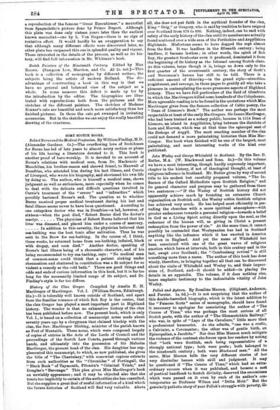John Wesley and George Whiterield in Scotland. By the Rev.
D. Butler, M.A. (W. Blackwood and Sons. 5s.)—In this volume we have a most interesting, though hardly supremely important, chapter in the history, if not of theological thought, at least of religious influence in Scotland. Mr. Butler gives by way of second title to his modest but carefully prepared volume, "The In- fluence of the Oxford Methodists upon Scottish Religion," and its general character and purpose may be gathered from these two sentences :—" If the Wesley of Scottish history did not apparently achieve much by founding an extensive Church organisation on Scottish soil, the Wesley within Scottish religion has achieved very much. He has helped most efficiently in per- vading the churches with a more spiritual atmosphere—with greater endeavours towards a personal religion—towards a belief in God as a Living Spirit acting directly upon the soul, as the redeemer of the human will, as giving in Christ a present redemption from the power of sin." At the same time, it cannot possibly be contended that Wesleyanism has had in Scotland any thing like the influence which it has exerted in America or even in England. And yet the name of Whitefield has been associated with one of the great waves of religious emotion which have at intervals, both in this century and in the last, swept over Scotland ; the " Cambuslang revival" is still something more than a name. The author of this book has done wisely, therefore, in bringing together all that can be discovered about the visits of Whitefield and Wesley to, and their impres- sions cf, Scotland, and—it should be added—in placing the details in an appendix. The volume, if it does nothing else, bears emphatic testimony to the indomitable vitality of John Wesley.






















































 Previous page
Previous page